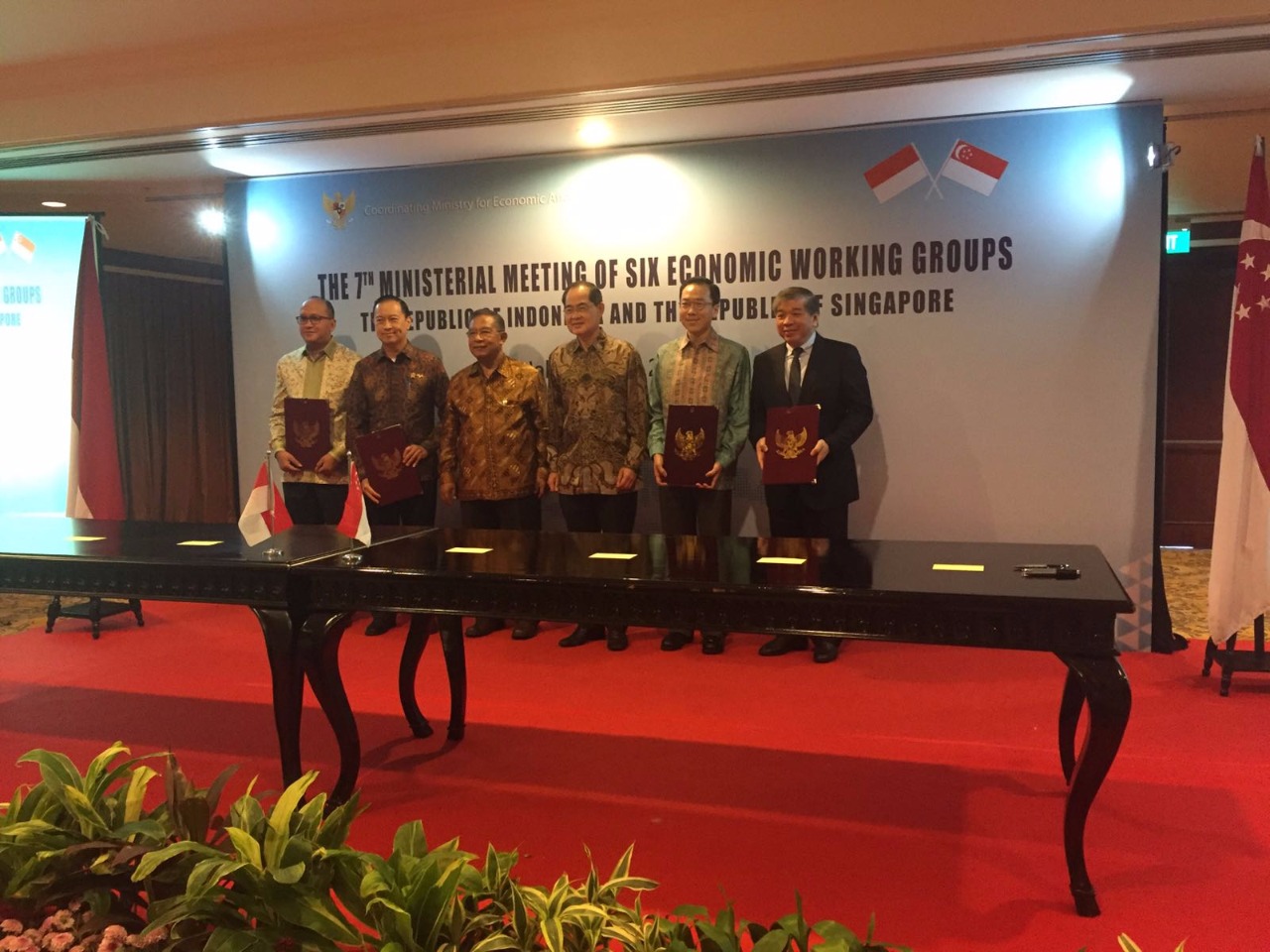Singapore and Indonesia sign memorandum of understanding to set up business council to expand cooperation
Sign up now: Get ST's newsletters delivered to your inbox

From left: Indonesian Chamber of Commerce and Industry chairman Rosan Roeslani, Indonesia's Investment Coordinating Board (BKPM) chairman Thomas Lembong, Coordinating Minister for Economic Affairs Darmin Nasution, Singapore's Trade Minister Lim Hng Kiang, Economic Development Board chairman Beh Swan Gin, and Singapore Business Federation chairman Teo Siong Seng, after the MOU signing on Friday (July 28) in Jakarta.
PHOTO: MTI
Follow topic:
JAKARTA - Singapore and Indonesia have inked a memorandum of understanding (MOU) to establish a business council to expand bilateral cooperation, Singapore's Ministry of Trade and Industry (MTI) said in a statement on Friday (July 28).
The Indonesia-Singapore Business Council (ISBC) was first mooted during a bilateral meeting between Singapore Prime Minister Lee Hsien Loong and Indonesian President Joko Widodo at the Leaders Retreat in Semarang, Central Java, in November last year.
The signing of the MOU between Indonesia's Investment Coordinating Board (BKPM) and the Singapore Economic Development Board (EDB) was witnessed by Trade Minister Lim Hng Kiang and his Indonesian counterparts at a bilateral working groups meeting earlier in the day.
During Mr Lim's two-day Jakarta visit, he attended the 7th Singapore-Indonesia Six Bilateral Economic Working Groups (6WG) Ministerial Meeting, and met Indonesian Coordinating Minister for Maritime Affairs Luhut Pandjaitan, Coordinating Minister for Economic Affairs Darmin Nasution, Trade Minister Enggartiasto Lukita, and BKPM chairman Thomas Lembong.
BKPM figures released earlier in the week showed that Indonesia's biggest foreign investor in the second quarter of 2017 was Singapore with US$1.6 billion (S$2.17 billion) in investments, followed by Japan (US$1.4 billion) and China (US$1.3 billion).
Singapore and Indonesia have always enjoyed strong economic ties. In 2016, bilateral trade reached $56.1 billion, and Singapore was Indonesia's top foreign investor in 2016 with investments amounting to more than S$13 billion. Both countries are the top source of visitor arrivals for each other.
During the meetings, the ministers discussed ongoing bilateral initiatives in specific sectors such as energy and tourism, the two priority sectors that PM Lee and President Joko had identified as potential areas of cooperation last year.
Agreements between companies from both countries in those sectors, including a pact between ONE15, a subsidiary of SUTL Enterprise, and Pelindo Properti Indonesia to develop a new marina in East Java's Boom Banyuwangi; and an MOU between Genting Cruise Lines and Indonesia's Pelindo III to develop the berth in North Bali's Celukan Bawang port to receive cruise ships were going well.
There has also been notable progress in tenancy at the Kendal Industrial Park (KIP) in Central Java since it was officially opened during the last Leaders Retreat.
MTI said the ministers agreed that enhancing air connectivity was also important to improve tourism flows and investment, and facilitate further economic cooperation.
The ISBC, the ministry added, will help identify potential areas of cooperation between the business communities of the two countries as well as foster closer interaction and strengthen the networks between the respective private sectors.
Mr Lim's visit comes two months before the two Asean nations celebrate 50 years of diplomatic ties at the next retreat to be held in Singapore on Sept 7.
As part of bilateral efforts to strengthen economic relations, Singapore and Indonesia have worked on various activities in areas such as energy, tourism, digital economy, vocational training, and agri-business.
Mr Lim returns to Singapore after his visit to BLOCK71 Jakarta, a 1,500sq m business incubation facility set up between NUS Enterprise, the entrepreneurial arm of the National University of Singapore (NUS), and Indonesian corporate giant Salim Group.
Speaking to reporters at BLOCK71 Jakarta on the ISBC, Mr Lim said the council's focus will be on infrastructure, e-commerce and urban solutions, which fit well with President Joko's vision and priorities for Indonesia.
"So in infrastructure, we mean toll roads, public infrastructure, MRT stations, MRT systems, power generation, and urban solutions will be urban transportation, waste treatment," said Mr Lim.
"Indonesia's urbanisation is growing and the infrastructure need is very big, and you need to leverage private capital to provide solutions and not just depend on public investment."

